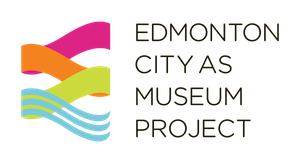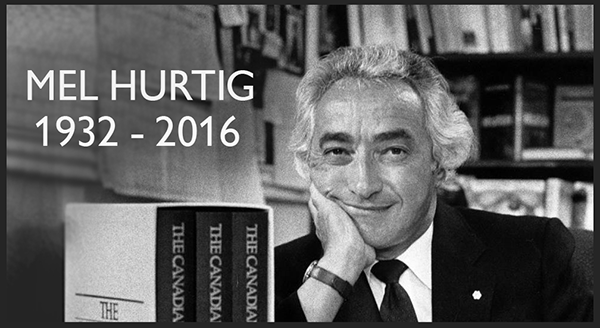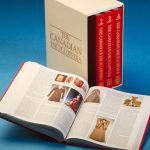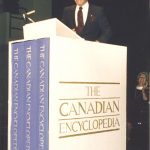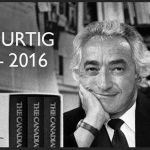Hurtig’s Firsts
Mel Hurtig didn’t start in the book business, but once there, he fell in love. In his 1996 autobiography At Twilight in the Country: Memoirs of a Canadian Nationalist, Hurtig said, “My years as a bookseller were exciting and stimulating and they changed me in a thousand ways.”
Those years began in 1956 when he opened Hurtig Books at the age of 24. The store, north of Jasper Avenue on 103rd Street, was the first books-only store between Toronto and Vancouver; it was one of Hurtig’s many firsts. His publishing company, Hurtig Publishers Ltd., which he started in Edmonton in 1972, was the first national English-language publisher outside Toronto.
Political Views
Hurtig became interested in politics in 1967, after Prime Minister Lester Pearson announced he was retiring and the search for a new Liberal Party leader—who would also become Prime Minister—began. At the time, people were speculating that Quebec would leave the country. Hurtig said, “The more I thought about these dire predictions, the more I travelled across the country and fell in love with it, and the more I read and listened, the more convinced I became that I should try to do whatever I could to see that the right person [Pierre Trudeau] became the next prime minister.” Although some suggested Hurtig work with the provincial Liberals, Hurtig said, “My interest was in Canada as a whole” and in its sovereignty. In 1972, he ran—unsuccessfully— for Parliament as a Liberal; in 1973 he left the party.
Hurtig also helped form the Committee for an Independent Canada (CIC) with others who shared his concerns about heavy foreign ownership in Canada and its influence on our culture, including fellow publisher Jack McClelland of McClelland & Stewart. From 1973-74, Hurtig was chair of the CIC, which was active until 1981.
In 1985, Hurtig established the Council of Canadians (COC), which still exists today, to raise awareness of Canadian nationalism and lobby against free trade. In 1992, Hurtig resigned from the COC to launch a new political party. The National Party of Canada had 171 candidates in the 1993 federal election. In September 1994, however, the party was dissolved due to internal struggles. Disappointed, Hurtig said in his press statement, “We tried and lost. Better to have tried and lost than not to have tried at all…. my own plans are to leave politics completely and begin work on two books that I have promised my publisher.” Although his official political life ended, Hurtig continued to share his political views through writing and other activities.
Politics and Publishing
Hurtig took his nationalist views and focus on Canadian culture into his publishing business early on. In the 1950s and 1960s, very few Canadian publishers existed, and the market for Canadian books was tiny. In At Twilight in the Country, Hurtig said, “Naturally, having learned all this, I decided to become a Canadian book publisher.”
Even before starting Hurtig Publishers in 1972, he collaborated with American publisher Charles Tuttle in 1967 to launch the Canadian Reprint Series, which reproduced out-of-print non-fiction Canadian classics. The first was Johnny Chinook: Tall Tales and True from the Canadian West by Robert E. Gard, originally from the 1940s. In his autobiography, Hurtig said, “Almost immediately I realized that I loved publishing as much or even more than bookselling.” In 1972, this preference prompted him to sell his bookstores (by then there were three) to raise money for publishing.
Eva Radford is an Edmonton editor who worked at Hurtig Publishers from 1975 to 1977 and saw him occasionally after that. She says she learned everything about publishing from Mel. “The thing that impressed me… was how… he knew what we needed to have to be informed Canadians.” When people said a publishing house in Edmonton wouldn’t succeed and books by Western Canadian writers wouldn’t sell, she says Hurtig “really went against the stream and did very, very well at it.”
Publishing was a way Hurtig could further his political aims. Radford says this was because “he could direct the list, and he could choose the books. … It gave him a platform.” She also says that he published some books that would make a lot of money to finance “books that he thought probably weren’t going to bring in a fortune, but they were books that he believed in.” These are some of the politically influenced books Hurtig Publishers produced.
- The New Romans, an anthology of essays (1968)
- The Unjust Society by Harold Cardinal (1969)
- The Tar Sands: Syncrude and the Politics of Oil by Larry Pratt (1976)
In his 1999 book The Literary History of Alberta, George Melnyk wrote, “[Hurtig’s] roots in Alberta and its retail book-trade, plus his devotion to Canadian nationalism, provided the framework for his successful publishing enterprise.” Radford believes those elements provided more than the framework for Hurtig—they provided the purpose.
Today, Melnyk says, “The 1960s were an important time for Canadian nationalism because of the Centennial in 1967, which brought a great deal of government and public attention to the issue of national identity.” Hurtig’s success with the Tuttle reprints “quickly encouraged him to turn to original works. Because of his Canadian nationalism he developed a national profile for his publishing firm.” For example, Hurtig was named Canadian Book Publisher of the Year in 1975 and 1981.
In his book, Melnyk also said, “Hurtig was able to wed his fervent public nationalism with business acumen to create an important publishing vehicle for Canadian and Alberta authors.” In a recent interview, Melnyk explains further. “Hurtig was part of a wider phenomenon—cultural nationalism—that exploded in the 1970s with numerous new, Canadian-owned publishing houses coming on stream and making a literary impact because they chose to publish only Canadian authors. There was a latent market for Canadian writers that these publishing houses developed.”
The Canadian Encyclopedia
In his autobiography, Hurtig describes how he decided to publish The Canadian Encyclopedia (TCE), then the biggest-ever Canadian publishing project. At a teachers’ convention in Swift Current, Saskatchewan, in the early 1970s, he was alone in a school library preparing his speech. He noticed few books were Canadian and all the reference books and encyclopedias were American. That recognition spurred him on. “I was disgusted. That day, before I climbed the steps to the auditorium stage, I resolved to publish a Canadian encyclopedia.”
Radford believes that Hurtig’s decision to publish the encyclopedia was a political decision not a publishing one. “Most people would have advised him against doing it as a publishing project. They would have said, ‘You’re gonna lose your shirt.’ … I think it was 95% political. He wanted to do it. He wanted to do it from out west.”
Premier Peter Lougheed’s government provided $4 million in funding, and in June 1979, Hurtig hired James Marsh as Editor-in-Chief for The Canadian Encyclopedia. It took many years and work from many writers and editors, but Hurtig Publishers Ltd. published The Canadian Encyclopedia in 1985 to the fanfare of a launch party at the Citadel Theatre on September 6. The party was attended by about 1000 guests and featured a huge replica of the three-volume set as a podium.
On his website, Marsh says, “Hurtig was a publisher like no other and commanded attention far beyond the scope of his modest publishing company. He attracted a special audience of nationalistic Canadians who almost certainly purchased the encyclopedia as a gesture of national pride.”
End of an Era But Not the End
In May 1991, Mel Hurtig sold Hurtig Publishers Ltd. to McClelland & Stewart, but that wasn’t the end of his time in books or politics. That same year, Stoddart Publishing Co. Limited published his first book, The Betrayal of Canada, a critique of the North American Free Trade Agreement (NAFTA). Hurtig later wrote other books based on his political ideas, including these.
- Pay for Rent or Feed the Kids: The Tragedy and Disgrace of Poverty in Canada (2000)
- The Vanishing Country: Is It Too Late to Save Canada? (2003)
- The Arrogant Autocrat: Stephen Harper’s Takeover of Canada (2015)
Marsh describes Hurtig as a man who “was primarily an economic nationalist and published a few books by others on the subject. Ultimately, it was through his writing and speaking that Mel expressed his political beliefs. His company and the encyclopedia provided a strong backdrop, and financial support, for his wider activities.”
Legacy
Mel Hurtig believed deeply in Canada and built a legacy where his publishing interests intersected with his politics. As James Marsh recollects, “For 20 or 30 glorious years Mel spoke out for Canada in a way that no one does now, and to me he was one of those rare people with such unbounded confidence in himself that he started things: bookstore, publishing company, nationalist organizations, political party and yes, The Canadian Encyclopedia. I have never met such an enthusiast as Mel Hurtig.”
CBC’s Telescope broadcast an interview with Mel Hurtig on October 6, 1970. You can watch the video here. http://www.cbc.ca/archives/entry/telescope-mel-hurtig
References
Hurtig, Mel. 1996. At Twilight in the Country: Memoirs of a Canadian Nationalist. Stoddart Publishing Co. Limited, Toronto.
Melnyk, George. 1999. The Literary History of Alberta: Volume Two. The University of Alberta Press, Edmonton.
Marsh, James. jameshmarsh.com/2011/11/brief-history-of-the-canadian-encyclopedia/
The Canadian Encyclopedia. thecanadianencyclopedia.ca/en/about/
University of Alberta Library Archives. archives.library.ualberta.ca/FindingAids/MelHurtig/hurtig.html
